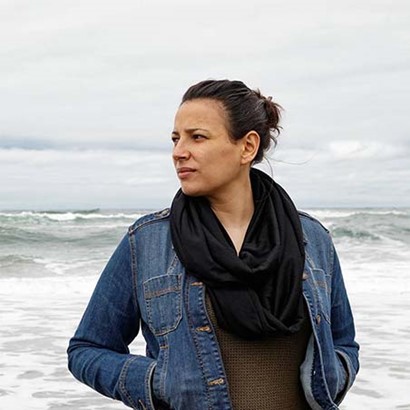
‘It felt like I wasn’t doing something insane on my own’
An interview with Sheima Benembarek
“Who am I writing this for? What is the point of this? What’s the reading experience that I want people to have?” Those are the central questions Sheima Benembarek (2020) asked herself as she began writing her manuscript as a student in the King’s MFA in Creative Nonfiction program.
That manuscript eventually became Halal Sex: The Intimate Lives of Muslim Women in North America, which was released by Penguin Random House Canada in March 2023. It’s a collection of true stories about Muslim women and how they’ve reconciled — or, in some cases, haven’t — their faith with the sexual freedoms they’re afforded in North America. The manuscript was also a finalist for the second annual Penguin Random House Canada Best Nonfiction Book Proposal MFA Prize.
For Benembarek, a Toronto-based journalist and editor, who’s held editorial roles at Toronto Life, The Walrus, and Broadview, the original plan was to write a book that paired interviews with her own research and analysis. As she made her way through the program, however, her feelings about storytelling changed.
“In the beginning, I was going to do it using each of the participants as a frame for more analysis or discussion or journalism about feminism and Islam,” she says. “Then I changed my mind. I realized that writing in that way wasn’t going to be as accessible as I wanted the book to be.”
Under the guidance of her mentor, Ayelet Tsabari, Benembarek weaved in stronger fictional elements — such as scenes and narrative arc — so that each person’s experience reads more like a short story.
“Ayelet was fantastic,” she says. “She has a background in both fiction and nonfiction, so it’s not impossible that her influence on me — using fictional devices, for example — shaped the way I wrote the book. I want the average person to be able to read it, not just my writing and journalism and editing colleagues — you know, like some young girl in Mississauga.”
As Benembarek worked her way through the manuscript, interviewing dozens of Muslim women, she found herself questioning the way she herself viewed Islam. Born in Saudi Arabia and raised in Morocco before moving to Canada to study creative writing at Montreal’s Concordia University, Benembarek identifies as Muslim, but suddenly found herself evaluating her faith through a stronger feminist lens.
“There’s a lot of stuff that’s decided upon by men. The Muslim patriarchy has been in control of the faith and the religious spaces, [deciding] who gets to pray where and wear what. For example, the hijab is not in there, it’s not in the Quran, not in that way — ‘women must wear the hijab out in public.’ It says ‘keep in mind that you should try to be modest in your attire.’ That is such a huge leap from ‘be modest in your attire’ to ‘cover your hair and face.’ We relegate interpretations to a select group of people and forget to [interrogate] it,” she says.
“I think that’s the thing that surprised me the most, is that Islam is a lot more open and accepting than the Muslim patriarchy wants us to believe.”
For Benembarek, conducting this much research, not to mention the writing of the manuscript itself, meant putting significant parts of her life on hold — turning down job offers, placing friendships temporarily on the backburner — to work on her book, something that was easier to do with the support of the King’s MFA community.
“Being there with these people who were going through the same thing, feeling the same insecurities, trying to tell their own story … felt like I wasn’t doing something insane on my own,” she says. “It’s a huge sacrifice and that sacrifice is only understood by other people who are doing the same thing.”
If she has one piece of advice for students new to the program or considering enrolling, she says it’s to slow down and appreciate the process. “If you remove the stress and the pressure of capitalistic production you’ll have a better time,” she says. “Whether you sell your manuscript or not, just writing a book is something that deserves applause and time.”

